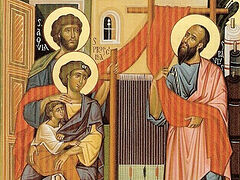After egotism we encounter avarice. When we hear this word, we think we’re talking about love of money. However, avarice isn’t only that.
Why is avarice a sin? After all, we all have money—you have money, I have money, the Church has money, the monasteries have money, and Christ had money. Money isn’t the problem. Money by itself isn’t bad. It’s avarice that’s bad. What does it mean?
Let me remind you what the second virtue is—hope. The first is faith, and in connection with it we have said that the egotist cannot come to believe because he only believes in himself. He believes in himself—only him, and no one else! The egotist is essentiallyan unbeliever. He’s impenitent, closed up within himself. His egotism doesn’t allow him to do anything.
The lover of money has no hope in God—which is the second virtue after faith—because he hopes in his money. “I need to feel a full pocket.” There are elderly people, about a hundred years old, who have a ton of money in the bank and who worry about it because they’re saving it “for old age.” They themselves are literally on the verge of death, and they’re saving thousands of dollars in the bank. It's unthinkable for the avaricious man to spend his money, because he has no hope in God, he hopes in money—and this is the essence of the sin.
And not only in money, but also in our knowledge: “I rely on my knowledge, on my strength; I’m something, I have power, I have a position, I have an education, financial well-being.” Sin is to hope not in God, but in your own strength, in your money, in your status, in your knowledge, in your abilities, in your beauty and everything else, because it steals your heat from God and makes it cleave to something else. You hope that you’re so handsome or so beautiful that you don’t even have to look around at others. Heaps of young people want you for their wife, but you reject them all, because you think some fairytale prince will come and ask your hand. You’ve read a lot of fairy tales like that, remember?
How does this obstruct a marriage? It obstructs it because each person closes in on his own affairs. You can see today that in every other family the spouses spend money separately, then every month they sit down together and add it all up. I advise them to hire an accountant to sort it all out and not swear at each other about who spent more… One pays for water, the other for electricity, this one for gas, and they calculate everything and pay that way. Few people make it through this—for each to manage money and not be afraid of the other. They go to buy a house and they’re afraid:
“Put half the house in my name!”
It’s so that tomorrow, contrary to expectations, they wouldn’t get divorced and the other wouldn’t be able to take the whole house for himself. As if that’s the problem—who gets the house when they get divorced…
This mentality—“my stuff,” “my time,” “I’m going out with my friends,” “I have a friend too,” “I have my plans”—it’s this “mine” that binds me to various things. In monasticism, this is overcome through non-acquisitiveness: You have nothing, and you’re not allowed to have anything at all, not even ten dollars.
How is this overcome in marriage? Through shared ownership. Everything we have at home is ours, in common. The Apostle says we have no authority even over our own body (1 Cor. 7:4)—I don’t even belong to myself. In one text, St. John Chrysostom says: “Why are you constantly talking about mine and yours, when my body doesn’t belong to me, and your body doesn’t belong to you, but to me?”1 One belongs to the other—there’s no “mine” and “yours.”
We see that common ownership was a distinctive feature of the early Christian Church, because the people had faith in God then, not hoping in anything else. We have no hope in God; we hope in our own strength: “I have to do everything, I have to manage to get everywhere, I have to achieve everything, I have to do it.” You often hear:
“How can I handle everything? How much longer do I have to be torn apart like this? I have to do everything!”
Our elder told us about a woman from his village who said:
“I still have so many things to do, and the day’s just getting started!”
How does hope in God disappear? When we think that we have to do everything, think of everything, organize everything so that everything would be perfect, and inside the thought that everything depends on us just gnaws at us.
Calm down, leave it to God! Do what you can, and have hope in God!
Break out of this; free yourself from this suspicion that arises from a lack of hope. You begin to build your marriage, and instead of building it in hope for success, you start contemplating the probability of failure. But this is a mistake; this is already a failure. You make a beginning but you don’t learn that in marriage you don’t have your own things: neither your own space nor your own time, and you don’t even belong to yourself but to the other.
Even in relation to your child. A mother says:
“My son!”
Your son, your daughter, instead of our child, and especially if her son gets married, then it really starts! The daughter-in-law hears: “My son!” and starts to get angry.
And he says: “My mama!”
The daughter-in-law hears this, and a war begins, because it’s her husband, that is, even she hasn’t overcome the feeling of ownership: “Yes, he’s my husband, which means he’s not your son! So she’s not your mother!”
And then there’s a whole heap of similarly offensive words.
Thus, this commitment to mine, yours, and whoever else’s is truly a great temptation in marriage; it’s a destructive factor, overcome through common ownership, through the common use of things with overcoming our attachment to what we consider to be ours—place, time, opinions. I know spouses who fight over a soccer team. Yes. They fight about a party, about a number of other things, and one doesn’t agree with the other. All of this is a manifestation of avarice—this passion, an all-encompassing passion, which cuts off hope. Whoever cuts off his hope in God is overcome by stress; he exhausts himself; he wears himself out.




